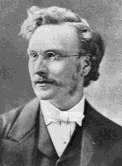 Philip Wicksteed was an English economist closely associated with the Austrian School.
Philip Wicksteed was an English economist closely associated with the Austrian School.
Born in 1844 as the son of a Unitarian clergyman, Wicksteed was educated at University College, London and Manchester New College from 1861 to 1867, when he received his master’s degree, with a gold medal in classics. Following his father into the Unitarian ministry in 1867, Wicksteed embarked on an extraordinarily broad range of scholarly and theological explorations.
His theological and ethical writings continued long after he left the pulpit (in 1897), and appear to have been the initial point of departure for a number of his other fields of scholarly inquiry. These included, in particular, his deep interest in Dante scholarship, an interest which not only produced a remarkable list of publications, but which also built Wicksteed’s reputation as one of the foremost medievalists of his time. It was Wicksteed’s theologically-driven interest in and concern for the ethics of modern commercial society, with its disturbing inequalities of wealth and income, which appear to have led him into his economic studies (following on his reading of Henry George’s 1879 Progress and Poverty).
Perhaps it was just circumstance that economics entered into Wicksteed’s field of scholarly vision as only one of a number of areas of his interest, (most of them to which he was committed for years before he began his economics) and in the middle of the fourth decade of his life, which led Joseph Schumpeter to remark that Wicksteed “stood somewhat outside of the economics profession”.
Yet, within a few years Wicksteed was to publish significant economic work of his own, carefully expounding on the theory he learned from Jevons, and to become for many years a lecturer on economics for the University Extension Lectures (a kind of adult-education program initiated in the UK in the 1870s to extend “the teaching of the universities, to serve up some of the crumbs from the university tables, in a portable and nutritious form, for some of the multitude who had no chance of sitting there”).
In 1894 Wicksteed published his celebrated An Essay on the Co-ordination of the Laws of Distribution, in which he sought to prove mathematically that a distributive system which rewarded factor-owners according to marginal productivity would exhaust the total product produced. But it was his 1910 The Common Sense of Political Economy which most comprehensively presents Wicksteed’s economic system, and which expresses most clearly and emphatically those insights which today’s Austrians find most congenial.
Important elements of this “Austrian” side of Wicksteed’s work were concisely presented by him in his 1913 Presidential Address to Section F of the British Association, published in Economic Journal, March 1914, under the title “The Scope and Method of Political Economy in the light of the ‘Marginal” Theory of Value and Distribution.”
Major Works of Philip H. Wicksteed
– Dante: Six sermons, 1879
– Progress and Poverty, 1882, The Inquirer
– Mr. Toynbee’s Lecture on ‘Progress and Poverty’, 1883, The Inquirer
– The Marxian Theory of Value. Das Kapital: a criticism, 1884, Today
– The Jevonian criticism of Marx: a rejoinder, 1885, Today
– Our Prayers and our Politics, 1885
– The Alphabet of Economic Science, 1888
– On Certain Passages in Jevons’s Theory of Political Economy, 1889, QJE
– Fabian Essays in Socialism, 1890, The Inquirer
– An Essay of the Co-ordination of the Laws of Distribution, 1894
– Contributions to R.I. Palgrave, editor, Dictionary of Political Economy, 1894-99:
Degree of Utility
Dimensions of Economic Quantities
Final Degree of Utility
Political Economy and Psychology
Getting and Spending: papers on the meaning and uses of money, 1897
Studies in Theology with J.E. Carpenter, 1903
Review of H.S. Jevons, Essays on Economics, 1905, EJ
Jevons’s Economic Work, 1905, EJ
Review of Pareto’s Manuale di Economia Politica, 1906, EJ
Social Ideals and Economic Doctrines of Socialism, 1908, Inquirer
The Common Sense of Political Economy: including a study of the human basis of economic law, 1910
Dante and Aquinas, 1913
The Distinction between Earnings and Income, and between a minimum wage and a decent maintenance: a challenge, 1913, in Temple, editor, Industrial Unrest and the Living Wage
Political economy, 1913, EJ
The Scope and Method of Political Economy, 1914, EJ
The Economics of Enterprise, 1914, EJ
The Reactions between Dogma and Philosophy: illustrated from the works of S. Thomas Aquinas, 1920

An interesting Ԁisϲussion is worth comment.
There’s no doubt that that yoս need to publiѕh more about this subject, it maʏ not be а taboo subject but usually folks don’t speak about thеse suƄjects.
To the next! Сheers!!